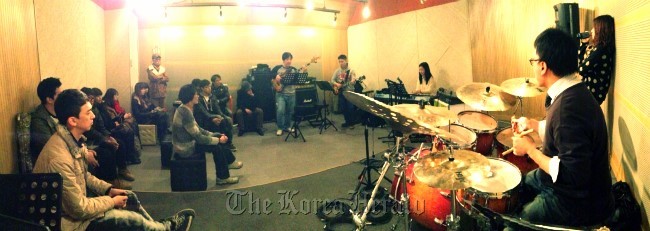Online communities bind people with common interests
By Korea HeraldPublished : March 8, 2013 - 19:41
Internet and mobile platforms are facilitating South Korea’s community culture to push its physical limits of time and space.
The online community era emerged in the late 1990s when local club-centric portals such as Cyworld and Freechal were introduced. It blossomed as portal sites competed for users with their own services, departing from traditional email and search services.
Naver, the nation’s biggest portal service in market share, hosted 9.05 million online communities in 2012, though its rival Daum boasted more than 10 million.
Web portals even encourage participation by offering support funds and souvenirs for online communities that hold real-life gatherings.
The online community era emerged in the late 1990s when local club-centric portals such as Cyworld and Freechal were introduced. It blossomed as portal sites competed for users with their own services, departing from traditional email and search services.
Naver, the nation’s biggest portal service in market share, hosted 9.05 million online communities in 2012, though its rival Daum boasted more than 10 million.
Web portals even encourage participation by offering support funds and souvenirs for online communities that hold real-life gatherings.

“Based on Korea’s community-oriented culture, the Internet generated a new form of group which creates synergy through online and offline meetings within communities. They mutually impact each other,” said Min Kyung-bae, a professor at Kyung Hee Cyber University.
“Online community services have enabled users to easily interact with other like-minded people,” said Choi Min-su, the operator of Naver community Music Band Association for Office Workers.
The music club is divided into 15 sub-groups composed of members for each band instrument ― guitar, bass, drums and vocals. Kicked off in 2010, the community now has 2,650 enthusiastic members in less than three years.
Each team meets weekly to practice, and the members keep in touch through the club’s website during the rest of time. They discuss which songs to play, share music videos they like and post housekeeping notes.
Communities on social networking services such as Twitter and Facebook, on the other hand, form differently than on such local portals.
“Unlike online cafes where people need to sign up prior to getting to know all the members in person, SNS-based communities tend to be built after building relationships and finding common interests among the people they already know,” professor Min said.
Automobile club Chatandang was launched by accident with a small group of car fanatics chatting via Twitter.
“It was only four friends sharing car-related talks, and now the number of club members has multiplied as power bloggers, reporters from automotive specialized media and officials from the car industry join in after hearing about us,” said Shin Sae-mi, the operator of the club.
By Park Han-na (hnpark@heraldcorp.com)
-
Articles by Korea Herald










![[New faces of Assembly] Architect behind ‘audacious initiative’ believes in denuclearized North Korea](http://res.heraldm.com/phpwas/restmb_idxmake.php?idx=644&simg=/content/image/2024/05/01/20240501050627_0.jpg&u=20240502091235)
![[Music in drama] Rekindle a love that slipped through your fingers](http://res.heraldm.com/phpwas/restmb_idxmake.php?idx=644&simg=/content/image/2024/05/01/20240501050484_0.jpg&u=20240501151646)







